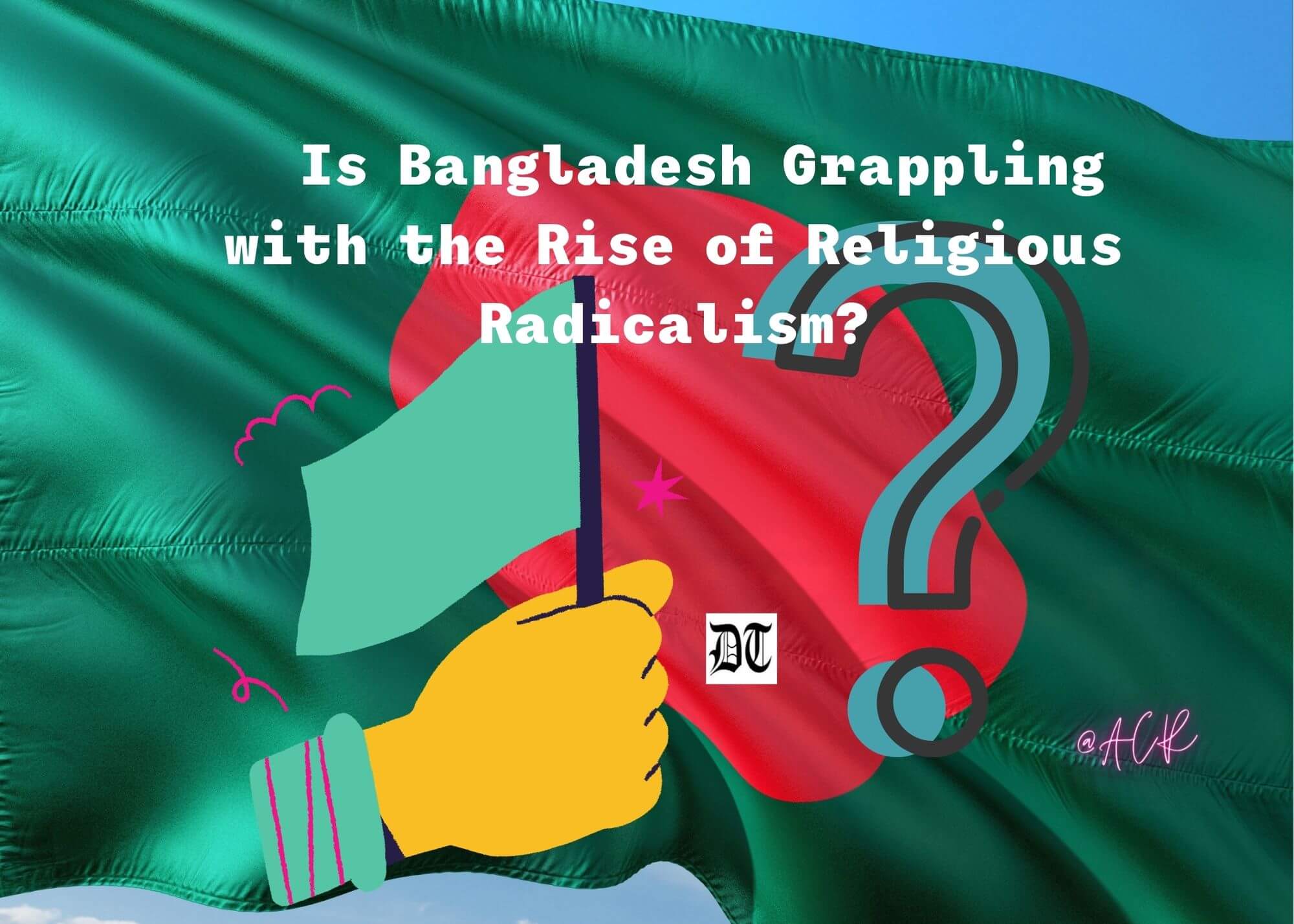Shantanu, a renowned security analyst, delves into the rise of religious radicalism in Bangladesh. He traces its genesis, growth in contemporary times and ramifications for India. Here’s a new column, on Geopolitics, beginning this Monday. An exclusive for Different Truths.

It’s rather ironic that Bangladesh, in its fiftieth year of independence, and the centenary year of its founding father, Bangabandhu Sheikh Mujibur Rahman, has to face an unanticipated challenge to deal with the ugly head of religious extremism now. It would, however, be wrong to say that Bangladesh is facing this menace for the first time in its half century of birth. It reeled under it before its birth and during the spells as an independent nation under the rule of a pro zealot party, Jamaat e Islami (JeI), which when partnered governance with Bangladesh Nationalist Party (BNP). BNP lived with infamy for its most condemnable role played by its founder, Ziaur Rahman, in the assassination of Sheikh Mujib and most of his family members in the bloody military coup of 1975. Hence, there were streaks of abetment in giving fillip to the spiralling bigotry. Incessant funding by some of the middle eastern countries for furtherance of Wahabism, the role of Taliban in Afghanistan, rise of Osama bin Laden, Pakistan’s covert and subversive activities on the soil of Bangladesh to avenge its humiliating defeat in the 1971 war, were collectively responsible to ensure that radical Islam remained alive and kicking in India’s eastern neighbourhood.
…the JeI was the fanatic outfit… in league with Pakistan supported Al Badr and Al Shams, carrying out genocide of intellectuals and Hindu minority in the most brutal manner…
Amid these developments, the JeI was the fanatic outfit, which had collaborated with the Pakistani occupation forces, in league with Pakistan supported Al Badr and Al Shams, carrying out genocide of intellectuals and Hindu minority in the most brutal manner, in the run up to the liberation struggle of 1971. Under the progressive government of Sheikh Hasina, currently Bangladesh’s Prime Minister, JeI was defranchised but the elements of intolerance and religious hatred espousing communal violence remain, who form the JeI cadres. Spurt in non-scientific madarsa education, the advent of ISIS, radicalisation through cyberspace, and other unsavoury factors contributed to reinforce the radical forces in Bangladesh.
As these developments were unfolding, another radical outfit called Hefazat e Islam (or Hefazat), came in the horizon, in 2010, through propagation of madarsa education, threatening to undo what Hasina and her government did to strengthen the secular forces. Initially, it was a complete lack of political wisdom of judgment on the part of the ruling establishment to assess the growth of Hefazat and the government also wanted to use this outfit to counter Jamaat and its affiliates. That was probably a serious blunder of catastrophic proportions.
The government… was a mute spectator when the liberals in Bangladesh were fatally targeted, in 2013, by the religious extremists…
The government, either on design of pursuing a policy of appeasement towards this section of religious ultras, or failing to see the writings in the wall, was a mute spectator when the liberals in Bangladesh were fatally targeted, in 2013, by the religious extremists, which took a toll of progressive bloggers, LGBTQIA+ activists and other free thinkers. This was a completely missed opportunity. Reading by default, the government’s complicity in endorsing the nefarious activities seems plausible.

Crucially, Hefazat’s hand in justifying the killings of 2013, went uncondoned. Emboldened by such a timid inaction on the government’s part, this fast-growing outfit started asserting and misinterpreting for imposition of medieval tenets of Islam like removal of statues from the public places and more specifically, demanded dismantling of a statue already in place in the Supreme Court. Again, the government yielded giving more breathing space to Hefazat which then started growing by leaps and bounds. By now, it has assumed monstrous proportions and looks like getting out of control. Such an unwelcome and threatening development went unheeded, once again, by the authorities.
Worse, the ugliest face of this organisation surfaced when it made its presence felt during Prime Minister Modi’s recent visit (March 27-28) to Bangladesh. Hefazat held massive and violent protest demonstrations leading to the authorities using force to quell the protests. The magnitude of the protests didn’t confine only within the capital city of Dhaka but spilled over to the other cities of Bangladesh as well. Numerous lives were lost, and enormous property was destroyed. Brahmanbaria took maximum brunt of the Hefazat fury as the Hindu minority were attacked, temples vandalised, and very sadly the Ustaad Alauddin Khan Academy (named after the Ustaad, who later settled in Maihar, in MP, starting a musical gharana), was set ablaze and a library was burnt to ashes. Such was the ire of intolerance and religious hatred perpetrated unbridled, by once an unknown outfit, that their frenzy continued even after PM Modi returned to India.
It’s unfortunate that such a violent activity happened under the nose of a government, which is proudly celebrating its golden jubilee of independence combined with the birth centenary celebrations of Sheikh Mujibur Rahman.
It’s unfortunate that such a violent activity happened under the nose of a government, which is proudly celebrating its golden jubilee of independence combined with the birth centenary celebrations of Sheikh Mujibur Rahman. Such occurrences definitely dampened the spirits of the rejoicings in the country as well as instilled a sense of fear and insecurity amongst the shrinking Hindu minority living in Bangladesh. The timing chosen by Hefazat was perfect and they struck at a time when Indo- BD relations are on the verge of firming up their closest possible ties.
Certainly, there are extraneous forces active to derail the Indo-BD bonhomie.
It’s important in the light of these incidents to identify the forces, which could be behind this well calibrated and orchestrated display of anti-India and anti-progressive acts of mindless violence? Certainly, there are extraneous forces active to derail the Indo- BD bonhomie. Support in terms of moral, material and logistics is suspected to have come from pro Pakistan lobbies or even from the invisible intelligence operations launched from Pakistan to rally the jehadi forces. Pakistan was solely responsible for unleashing terror, on Bangladeshis, 50 years ago. Many collaborators were executed under Hasina’s regime after regular trials. Same forces are once again trying to pursue disruptive actions by trying to drive a wedge between the pro and anti-India forces. Pakistan had come to notice in the past engaging in espionage activities against India by using Bangladesh as a turf for either sheltering the Indian North East insurgents or circulation of Fake Indian Currency Notes (FICN) to India through the BD orders.
Hefazat-linked recent disturbing incidents are indicators that Bangladesh needs to wake up and come down heavily on these jehadi mindset elements lest they destroy the secular fabric of Bangladesh. In addition to this, the rise of such radical religious forces has perilous implications for India. This calls for a complete vigilance with no lowering of guards at any cost. Finally, it’s Hasina and Prime Minister Hasina alone, who is capable of ruthlessly crushing an intolerant uprising like this. So, all possible support from India is also called for to jointly combat this menace. Warning is loud and clear. Acting in the threat looks the primary task to maintain a terror free region in South Asia which is already fraught with dangers emanating from home grown terrorists of Pakistan wreaking havoc in its immediate neighbourhood.
Visuals by Different Truths and the internet





 By
By

 By
By
 By
By
Informative article